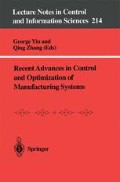Abstract
A production system is called improvable if limited resources involved in its operation can be redistributed in such a manner that a performance index is improved. The production systems considered in this work are the serial machining and assembly lines with unreliable machines and finite buffers. The limited resources involved are the total work-in-process (WIP) and the workforce (WF). The performance index addressed is the throughput. It is shown that the system is unimprovable with respect to the WF if and the only if each buffer is on the average half full. The system is unimprovable with respect to WIP and WF simultaneously if and only if the above holds and, in addition, each machine has equal probability of blockage and starvation. Thus, in a well designed system each buffer should be mostly half full and each machine should be starved and blocked with equal frequency.
The improvability indicators, mentioned above, have been applied to a machining line at an automotive component plant. Both WF and WIP improvability measures have been considered. It was shown that the throughput of the line can be increased by a factor of 2.
On leave from Department of Electrical Engineering Korea Advanced Institute of Science and Technology Taejon, Korea
Preview
Unable to display preview. Download preview PDF.
References
E. Deming, Out of the Crisis, Massachusetts Institute of Technology, Cambridge, Massachusetts, (1986).
E. Goldratt and J. Cox, The Goal, North Rivers Press, New York, (1986).
G. Taguchi, System of Experimental Design: Engineering Methods to Optimize Quality and Minimize Cost, UNIPUB/Kraus International Publications, Dearborn, Michigan (1987).
D. Jacobs and S.M. Meerkov, “Mathematical Theory of Improvability for Production Systems”, Mathematical Problems in Engineering, 1(2), 95–137 (1995).
J. A. Buzacott and L. E. Hanifin, “Models of Automatic Transfer Lines With Inventory Banks — A Review and Comparison,” AIIE Trans., 10, 197–207 (1978).
J.A. Buzacott and J.G. Shanthikumar, Stochastic Models of Manufacturing Systems, Prentice Hall, (1993).
Y. Dallery and S.B. Gershwin, Manufacturing Flow Line Systems: A Review of Models and Analytical Results, Queu. Syst., 12, 3–94 (1992).
S.B. Gershwin, Manufacturing Systems Engineering, Prentice Hall, (1994).
Author information
Authors and Affiliations
Editor information
Rights and permissions
Copyright information
© 1996 Springer-Verlag London Limited
About this paper
Cite this paper
Jacobs, D., Kuo, C.T., Lim, J.T., Meerkov, S.M. (1996). Improvability of serial production lines: Theory and applications. In: Yin, G., Zhang, Q. (eds) Recent Advances in Control and Optimization of Manufacturing Systems. Lecture Notes in Control and Information Sciences, vol 214. Springer, Berlin, Heidelberg. https://doi.org/10.1007/BFb0015116
Download citation
DOI: https://doi.org/10.1007/BFb0015116
Published:
Publisher Name: Springer, Berlin, Heidelberg
Print ISBN: 978-3-540-76055-9
Online ISBN: 978-3-540-40949-6
eBook Packages: Springer Book Archive

